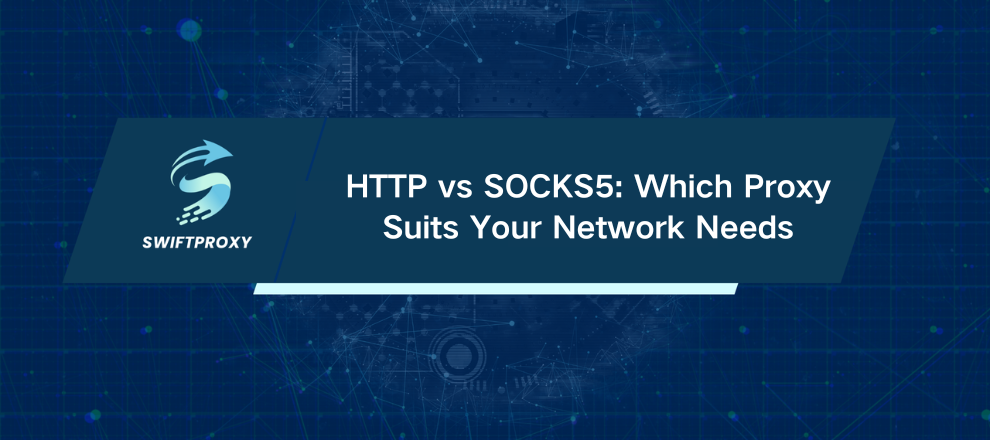HTTP vs SOCKS5: Which Proxy Suits Your Network Needs
Ever tried to access a website only to hit a block? Or maybe your network crawls under heavy traffic? That’s when proxies step in. They don’t just hide your IP—they control, protect, and speed up your online experience. Whether for business or personal use, understanding the differences between HTTP and SOCKS proxies isn’t just useful—it’s essential. Let’s break it down and uncover which proxy suits your digital life best.

What Is an HTTP Proxy Really
Think of an HTTP proxy as a middleman for your web requests. When your browser wants to fetch a webpage, it usually talks directly to the site's server. With an HTTP proxy, your request first hits the proxy server. The proxy then forwards it to the website, retrieves the data, and sends it back to you.
This setup isn't just about hiding your identity. HTTP proxies filter content, cache pages for faster loading, and can block suspicious sites before they reach your device. Businesses often use them to restrict employee access, speed up network performance, or manage traffic during peak hours. For individuals, HTTP proxies help bypass local restrictions or save bandwidth on slow connections. Essentially, they give you control over how data flows in and out.
What Exactly Is a SOCKS Proxy
Unlike HTTP proxies, SOCKS operates at a lower network layer. It handles raw data packets rather than just web traffic. This makes it versatile—it can manage web surfing, email, file transfers, gaming, and streaming.
There are two main versions: SOCKS4 and SOCKS5. SOCKS4 handles basic TCP traffic but lacks authentication and UDP support. SOCKS5, on the other hand, supports multiple protocols, authentication, and even encryption. That means it can secure your connection, making it ideal for sensitive data, large file transfers, or online gaming.
Why Use Proxies
Proxies aren't just convenience tools—they're shields, traffic managers, and performance boosters. With proper configuration, they enhance security, optimize speed, and give you more control over your digital environment. Choosing the right one can mean the difference between a slow, insecure connection and a fast, safe online experience.
Advantages of HTTP Proxies
Control web traffic: Filter ads, scripts, and undesirable sites.
Speed up page loads: Cache frequently accessed pages.
Basic security: Block malicious domains before they reach users.
Bandwidth management: Reduce strain on slower networks.
HTTP proxies excel at simplifying web access while maintaining moderate security. They're perfect when your primary goal is browsing or enforcing web policies.
Advantages of SOCKS5 Proxies
Protocol flexibility: Supports HTTP, FTP, email, gaming, and more.
Security: Authentication and encryption keep data safe.
Performance: Lower overhead makes tasks like VoIP, gaming, and file transfers faster.
SOCKS5 isn't limited to browsing. It's designed for power users who need versatility, speed, and robust security.
SOCKS vs HTTP
Security and Encryption
HTTP proxies primarily forward web traffic and offer basic encryption through HTTPS. SOCKS5 operates at a lower level, supporting multiple protocols, authentication, and encryption. For complex security needs, SOCKS5 outperforms HTTP.
Flexibility and Protocols
HTTP proxies handle standard web requests like HTML or JSON. SOCKS proxies manage almost any type of data, from streaming to command-line tools like wget. The more diverse your network needs, the more SOCKS shines.
Speed and Performance
HTTP proxies boost speed via caching but may slow down complex protocol tasks. SOCKS proxies, especially SOCKS5, excel at high-throughput operations like gaming, VoIP, and large file transfers, thanks to their lean data handling.
Real-World Applications
HTTP Proxy: Perfect for businesses controlling web access, individuals blocking specific websites, or anyone looking to speed up routine browsing.
SOCKS Proxy: Ideal for running multiple apps, secure file downloads, streaming, gaming, or any scenario involving diverse protocols. For example, using SOCKS5 with wget allows safe, efficient large-file transfers.
How to Choose the Right Proxy
Stick with HTTP if your goal is web browsing, content filtering, or caching. It's simple, reliable, and effective for straightforward tasks.
Opt for SOCKS5 if you need multi-protocol support, encryption, or authentication. It handles more than just web traffic—streaming, gaming, and file sharing are all in its wheelhouse.
For enhanced anonymity, consider rotating proxies (which switch IPs automatically) or residential proxies (linked to real home networks). The key is balancing speed, security, and usability to match your digital needs.
Final Thoughts
Choosing the right proxy depends on your needs. HTTP proxies work well for browsing and content control, while SOCKS5 excels at multi-protocol support and security. The right choice boosts speed, protects data, and gives you full control over your online experience.

















































